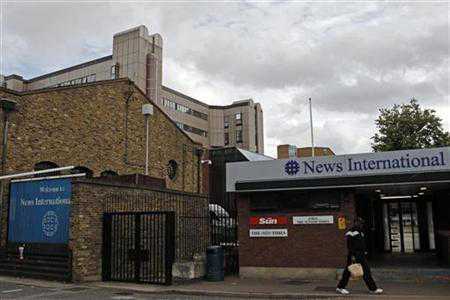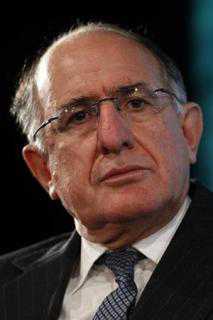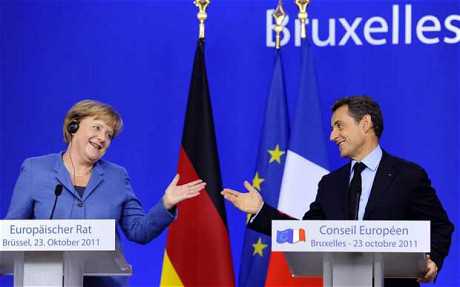 (Reuters) – A lawyer for Rupert Murdoch’s News Group Newspapers earlier this year accused the British Broadcasting Corporation of pursuing an investigation of alleged computer and phone hacking to “undermine” Murdoch’s bid to acquire full ownership of satellite broadcaster BSkyB.
(Reuters) – A lawyer for Rupert Murdoch’s News Group Newspapers earlier this year accused the British Broadcasting Corporation of pursuing an investigation of alleged computer and phone hacking to “undermine” Murdoch’s bid to acquire full ownership of satellite broadcaster BSkyB.
Julian Pike of the London law firm Farrer & Co, which also represents Britain’s Queen Elizabeth, sent a series of letters last March to the BBC expressing concerns at the British arm of Murdoch’s News Corporation that the BBC might have transgressed its commitment to impartiality for commercial or political reasons. The BBC denied this was the case.
The letters, whose full contents have not previously been reported, were sent in response to requests by journalists from the BBC newsmagazine Panorama to News Group for comment regarding alleged phone and computer hacking conducted by journalists for the Sunday tabloid News of the World.
Murdoch shut the paper last July amid a torrent of allegations about alleged ethical and legal lapses by its staff.
The Panorama program, headlined “Tabloid Hacks Exposed” focused on the alleged role of Murdoch journalists in employing “dark arts” – Fleet Street jargon for dubious and potentially illegal reporting tactics – and in particular allegations of “blagging” (jargon for pretending to be someone else) and computer and phone hacking at the News of the World.
Pike laid out News Group’s complaints about the BBC’s investigation in letters sent to Panorama in early March headed
“NOT FOR PUBLICATION & NOT FOR BROADCAST: STRICTLY PRIVATE & CONFIDENTIAL.”
In two letters, dated March 10 and 11, Pike suggested that the BBC might be pursuing the hacking story for business or political reasons rather than for journalistic motives.
Pike said that BBC Director General Mark Thompson had been “required to apologize” in November 2010 for adding his signature to a letter from a group of companies who were critical of News Corp’s bid to acquire the balance of shares in BSkyB which it did not already own.
In his March 10 letter, Pike noted that the BBC was planning to broadcast Panorama’s investigation at a time when the British government was actively considering Murdoch’s bid for BSkyB’s remaining shares. He noted that the BBC had an “obligation to avoid embroiling itself in a political and commercial battle that it should have nothing to do with.”
BSkyB is a principal competitor with the BBC in Britain.
In a lengthy letter sent to the BBC the following day, Pike said it had “not gone unnoticed” that the BBC, along with “certain other media organizations,” had been in “the vanguard of running a campaign against” News Corp regarding alleged News of the World phone hacking. Pike asserted that the BBC had “obvious political and commercial reasons” to use the phone hacking allegations “to attack our clients and undermine New (sic) Corp’s Sky bid.”
Pike said it was “quite apparent” that the program the BBC was preparing was “yet another attempt to undermine New Corp’s bid for Sky” (sic).
In the letter, Pike also accused the BBC of planning to take out of context an investigation by Britain’s Information Commissioner’s Office which alleged that publications other than the News of the World, including The Observer, a Sunday newspaper which is affiliated with the Guardian daily, had also engaged in questionable or illegal reporting practices.
In response to a request for comment, the BBC told Reuters: “Panorama investigations always come from a point of public interest and operate within the BBC editorial guidelines and Ofcom’s code. This program was no different and…details of the phone hacking scandal has been widely reported by numerous media organizations. Any suggestion it was made to further the BBC’s own interests is utterly without foundation.”
A spokesperson for News International, Murdoch’s principal newspaper publishing company in Britain, said the company had no comment on Pike’s accusation that the BBC had pursued the phone hacking inquiry for ulterior motives.
However, the spokesperson noted that the company on October 14 had issued a statement acknowledging that its Management and Standards committee, supervising News International’s response to the phone hacking controversy, had agreed with Farrer & Co. that the law firm would “stand down” from representing Murdoch’s News Group properties in “current or future” lawsuits filed by alleged News of the World phone hacking victims.
At a hearing before a British parliamentary committee which has been investigating phone hacking, Pike acknowledged that in 2008 he became aware of documentary evidence contradicting public statements by Murdoch aides that phone hacking at the News of the World had been the work of a “single rogue reporter.”
Pike told the committee he did not believe he had an obligation as a lawyer “to go and report something that I see within a case where there might have been some criminal activity.”
In a report on his testimony and other aspects of his letters to the BBC, the Guardian last week reported that Pike had admitted to parliament that he knew public statements by News of the World executives about the rogue reporter were misleading when he sent a letter to the BBC threatening “successful” litigation for defamation if the BBC accused News International executives of knowingly making untrue or misleading public statements.
The Guardian also reported that the BBC had referred Farrer & Co to a disciplinary authority for British lawyers because of this aspect of Pike’s letter.
The BBC confirmed that it had “written to the Solicitors Regulation Authority. seeking advice in relation to their rules governing the conduct of solicitors.”
In Britain, solicitors are lawyers who handle most out of court and pre-trial litigation, while barristers are lawyers who handle trials and appeal proceedings in higher courts.
Pike did not respond to an e-mail requesting comment. But a representative of Farrer & Co. disputed the Guardian’s interpretation of Pike’s letter and what Pike had said to Parliament. The firm had no further comment on its accusation that the BBC had acted for commercial or political motives.
The Solicitors Regulation Authority said that in July, it had launched a “formal investigation into the role of solicitors in events surrounding the News of the World phone hacking crisis,” and that it could make no further comment while that inquiry was under way.
 (Reuters) – A former top banker, weighing into a protest movement in Britain against abuses and excesses of modern capitalism, said on Sunday the market economy had lost “its moral foundations with disastrous consequences.”
(Reuters) – A former top banker, weighing into a protest movement in Britain against abuses and excesses of modern capitalism, said on Sunday the market economy had lost “its moral foundations with disastrous consequences.”



